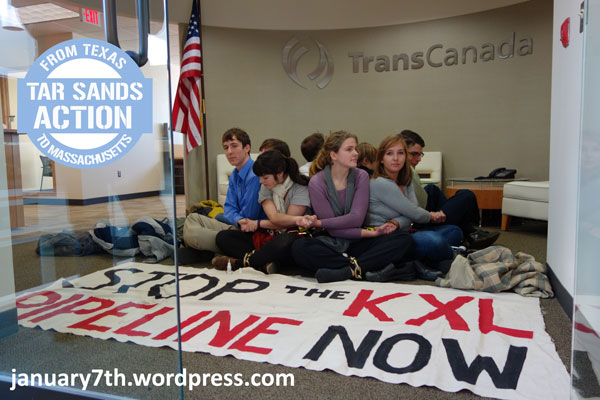Looking for ideas for your direct actions? Climate Reality’s monthly conference call on March 21 with organizers around the country provides a bloom of ideas for spring-boarding into action. Contact info for the groups on the call is at end of blog.
For a map of this week’s actions across the country see:
http://www.tarsandsblockade.org/weekofaction/planned_actions/. Included on the map is Massachusetts’ protest at TransCanada’s office in Westborough, and in New Haven, Connecticut, a protest at TD Bank, one of the biggest financiers of the pipeline. Occupy Pipeline New York has actions on Saturday at TD banks.
More ideas (in green) from groups on the call:
SHARE YOUR MATERIALS. Follow http://occupythepipeline.blogspot.com/ They will upload your materials or send to KXLBlockade@gmail.com . Materials for actions against TD Bank: http://bit.ly/TDdivest
SHARE YOUR NEWS Tar Sands Blockade provides on-line media support for actions across the country.
BE THEATRICAL TO ATTRACT MORE MEDIA ATTENTION. A well-rehearsed funeral procession at the TransCanada office in Massachusetts, with original song by Meladeego, (www.FuneralforOurFuture.wordpress.org) that involved 100 protesters on March 11 could be re-staged at other blockade target sites.

Video at www.FuneralforOurFuture.wordpress.com
Greenpeace and NCWARN in North Carolina issued a call to “Get Out Your Shoes” for a campaign aimed at Duke Energy to “Walk In Our Shoes”. The campaign against inequitable serial rate hikes by Duke Energy in North Carolina also was a call for people to think of the climate impacts and to walk on a renewable path. Shoes were donated to a non-profit. The actions were followed by a sticker campaign “Give the rate hike a boot!”.
At an anti-fracking protest at a land auction by the U.S. Bureau of Land Management, people showed up in haz mat uniforms. Puppets work too, such as the ostrich puppet that buries its head in the sand, and a polar bear with a pre-purchased ticket entering a corporate fund-raising event.
INCLUDE A CULTURAL COMPONENT TO ACTIONS. Invite local groups to perform such as the Raging Grannies singing parodies of familiar songs; dancers; and bands.
TARGET THE FUNDING STREAMS. Tar Sands Blockade.org’s corporate action strategy targets the funding streams that bank-roll or profit from toxic projects. The TD Bank is the site of several protests, e.g., Montpelier, VT. In Seattle, “Stop Tar Sands Profiteers Week of Action” continues strong with over 40 rallying at a pipeline company Michels Construction office outside Seattle.
SHOW UP AT PUBLIC MEETINGS AND TAKE ADVANTAGE OF AVENUES FOR COMMENT. Delaware Riverkeeper Network staged a People’s Hearing when they were silenced during a Delaware River Basin Commission meeting. Their campaign against fracking wants the Commission to look at the cumulative effects of proposed pipelines across the river basin, not one by one. Although the DRBC stopped gas drilling in the basin, pipelines are starting to cut across the basin carrying gas from other states. Riverkeepers had followed the public process earlier by attending hearings and submitting comments, to no effect. With warning, they attended the Commission meeting on March 6 and took over the meeting in order to present testimony that the regulations aren’t working sufficiently and the Commission continues “to sit on its hands and let FERC do the regulatory process.” Power already exists in the DRBC compact to make regulations. People (120+) stood up to give public testimonies from their seats; when the Commissioner called a recess in the back room, the protesters chanted and continued the meeting for 2 hours. They presented a citizen resolution for a vote, but were denied. Although not successful in bringing a vote against pipelines, the action helped with building their organization and increasing dialogue. The Riverkeepers had laid the groundwork through public comment.
SHOW OFF SUSTAINABILITY IN YOUR TOWN. The Berkeley Climate Action Coalition organized a Sustainability Walk and Neighborhood Asset Mapping Event by inviting the public on a walking tour of locally sustainable businesses and organizations.
EXPAND ON EARLIER ACTIONS. When 26 people handcuffed themselves together at the TransCanada office in Westborough MA earlier this month they were following on the heels of 8 students that chained themselves together inside the office in January. More than 75 supporters showed up as well. Within two weeks of the March action, another demo occurred at same location.
GET SUPPORT AND CARE FOR YOURSELF. Have you experienced organizer fatigue? Standing up to big oil can be exhausting. Some activists in Texas are facing a year in prison right now. Others have spent several weeks at a time. We have to have support and self-care to keep it up.
To hear the recording of the full call: https://www.freeconferencecallhd.com/playback.html?n=81941444-17-65-67-17-65-67-17-65-678-17-65-6732-17-65-67765174820;0OTMzNDY4MDI=1
Presenters:
Tar Sands Blockade – Ethan Nuss. http://www.tarsandsblockade.org/weekofaction/
Funeral for our Future – Adam Greenberg http://www.funeralforourfuture.wordpress.com/
Delaware Riverkeeper Network – Faith Zerbe http://www.delawareriverkeeper.org/
The Berkeley Climate Action Coalition –Marna Schwartz http://www.ecologycenter.org/climatecoalition/
NCWARN – Connie Leeper http://www.ncwarn.org/
The Center for Biological Diversity – Rose Braz http://www.biologicaldiversity.org/



